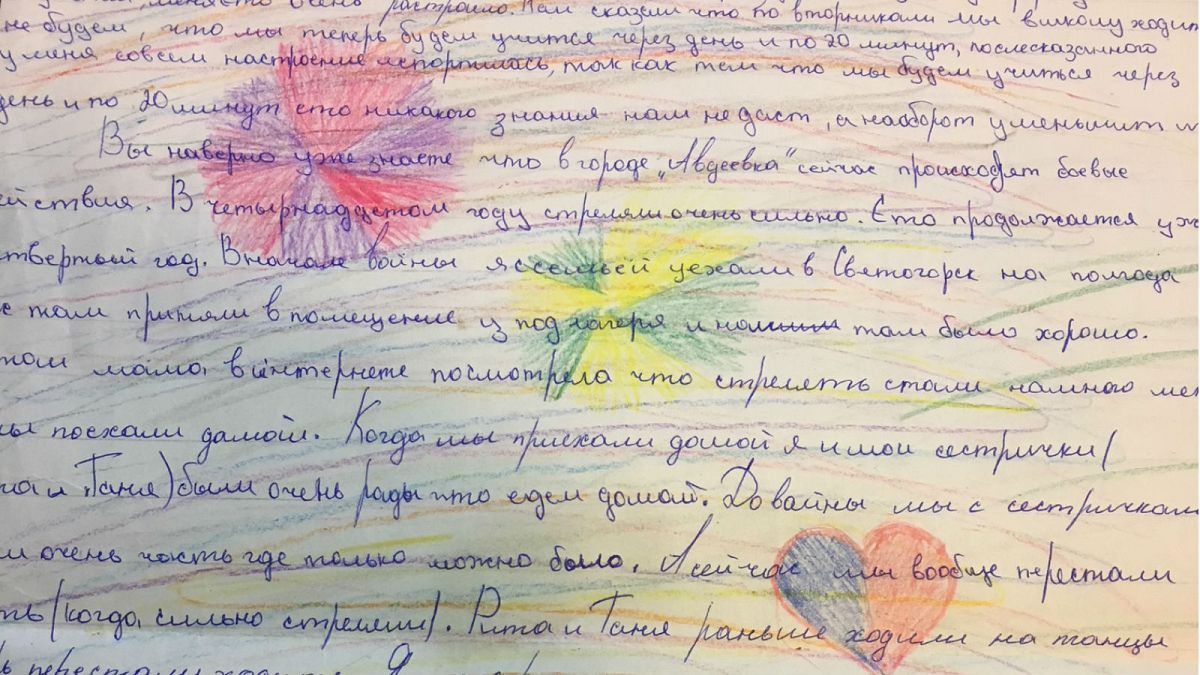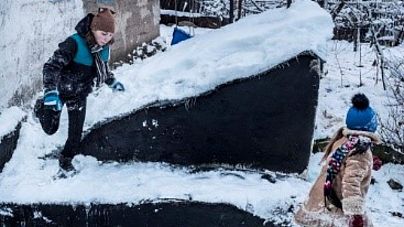A student and teacher in eastern Ukraine explain how the education system has suffered under the war
A 13-year-old student and teacher from eastern Ukraine have written letters explaining what it’s like to live through the conflict there, and how the education system has suffered.
Anya, 13, student, Avdiivka School #4
Hi,
My name is Anya, I’m 13 years old and I live in Avdiivka.
I go to school #4 and I like studying there very much.
Unfortunately, something bad happened. I got very upset after they told us that we would be studying remotely, there would be no school on Tuesdays and we would be coming to school every other day and each class would last 20 minutes only.
My spirits are down, as I realise that spending just 20 minutes at school will not allow me to gain any knowledge, but will only worsen it.
You have probably heard that Avdiivka is caught by hostilities and back in 2014 we witnessed some heavy shootings. That is why my family and I decided to move to Sviatogorsk at the beginning of the war, where we spent 6 months. We were accommodated in a former summer camp, and we felt good there.
Later my Mum read on the internet that the situation with the shooting in Avdiivka had improved and we decided to return home. Me and my little sisters Rita and Tania were very happy to go back home.
Before the war my sisters and I loved having long walks everywhere in the city, but now we hardly go out – when the shelling becomes intense.
In the past, both Rita and Tania used to go dancing, now they don’t dance anymore because of the shootings. I go to a ballroom dancing.
These days the shooting has become quieter, but I am not afraid of anything now.
Olga Prais, teacher, Avdiivka School #4
War. This word immediately makes you feel queasy. It is a crime against all living beings.
I don’t understand how it could be happening in Ukraine in the 21st century. How can somebody be killing ordinary people?
My city, Avdiivka, in eastern Ukraine, found itself in the middle of an armed conflict. Nobody would have thought that this would happen, that we would see buildings destroyed by shelling, that it would be frightening to go outside. Children from my city can distinguish between the sounds of explosions of different caliber shells. They know far too much about weapons.
I have been working at Avdiivka’s school # 4 for twenty years, and even during heavy fighting, I never left. I am an 8th grade homeroom teacher. I teach biology, geography, and physics. I have the largest class of middle schoolers, and it also has the largest number of children from families who have lived through this war and haven’t left the city.
There is a girl named Alina in my class, who almost died while doing homework at her desk at home. A mine landed near her house, the fragments of the shell broke the window and flew above her head. Alina barely had time to duck out of the way.
Sashko, a boy from our school was hit in his leg by a sniper.
The war does not pity adults nor children.
My city is listening to the ‘melody of war’ every day and still tries to live in its regular rhythm.
Children are playing in the playgrounds, grandmothers are hurrying to the marketplace. Only the sound of machine guns shooting and shells flying in from mortars and grenade launchers remind us that the war is close and can bring death at any minute.
The fighting for Avdiivka has been going on since the summer of 2014. The winter of 2015 was terrible. The city was shelled almost every day and night starting from Christmas. People were afraid to go to sleep and not wake up, to be killed or die in a fire while sleeping due to the shelling.
Tormented with fear, exhausted from the lack of sleep and very nervous, teachers still found strength to go to work. And we were very happy when the children also came to school. Children would apologize for not being prepared for class because they spent the entire night in the basement to shelter from the shelling.
After school, us teachers had to go through a checkpoint which divides the old and the new parts of Avdiivka. We were always caught in shelling. More than once my life was in danger, bullets went whistling by and shells exploded close to me.
We were feeling sadness, desperation, and happiness. Happiness because you and your family survived. At home, we slept in the corridor in the hallway. Dressed with a bag with documents and necessities at our side.
The city has been left without light, heat, and water numerous times because of endless shelling.
During the years of war, people have gotten so used to the lack of light, water, and problems with mobile connection that they are no longer scared when warned of a possible humanitarian catastrophe.
Everybody understands that there are many problems in the city where the war is going on, but this is not an excuse to give up.
On the contrary – I think the war unites the citizens. People who have known the horrors of war, learn to value life. Many people have come back home after trying to live elsewhere.
The constant risks of living in the war zone are psychologically hard to bear. I always teach my students to love their country and respect their people. However, I hope that soon this insidious and treacherous war will be over.
*Letters were provided to Euronews by UNICEF. *
The views expressed in opinion articles published by Euronews do not represent our editorial position. If you want to contribute to our View section, email ideas to: view@euronews.com

